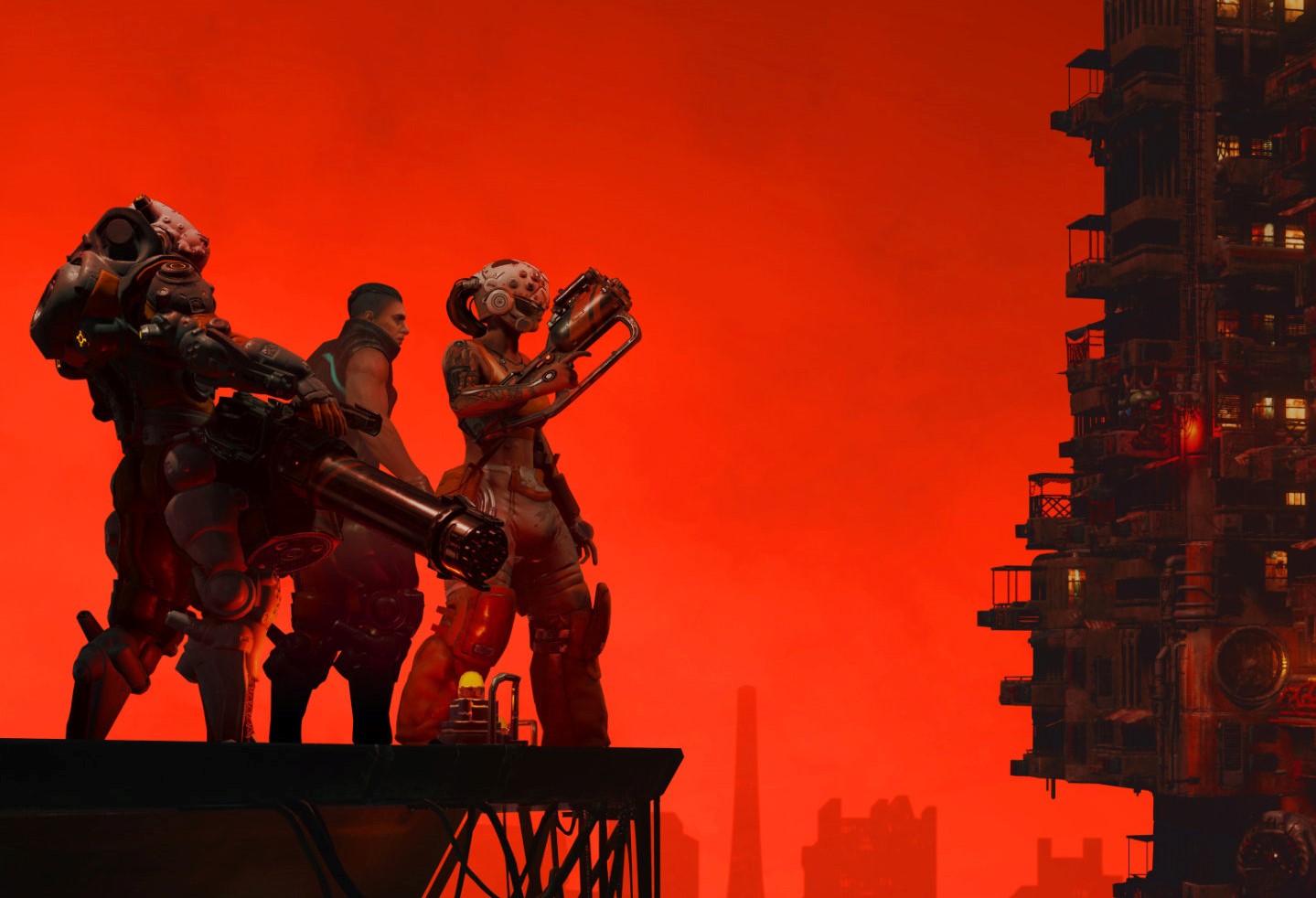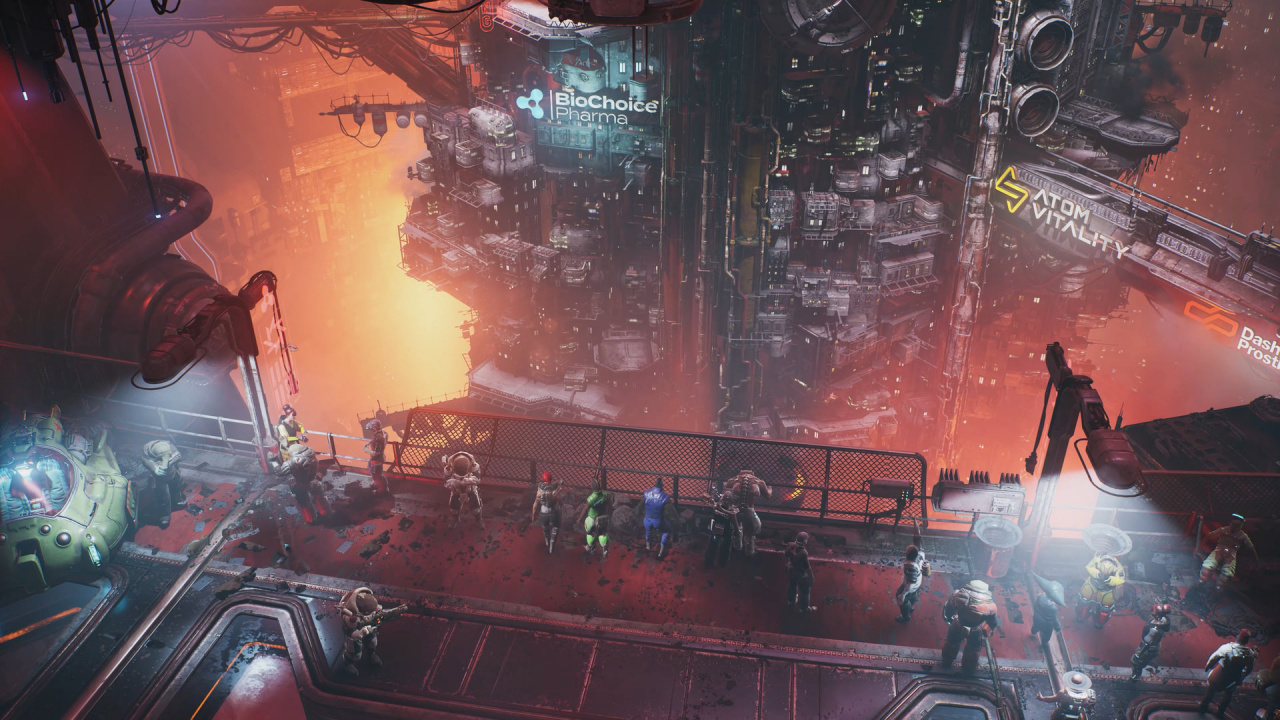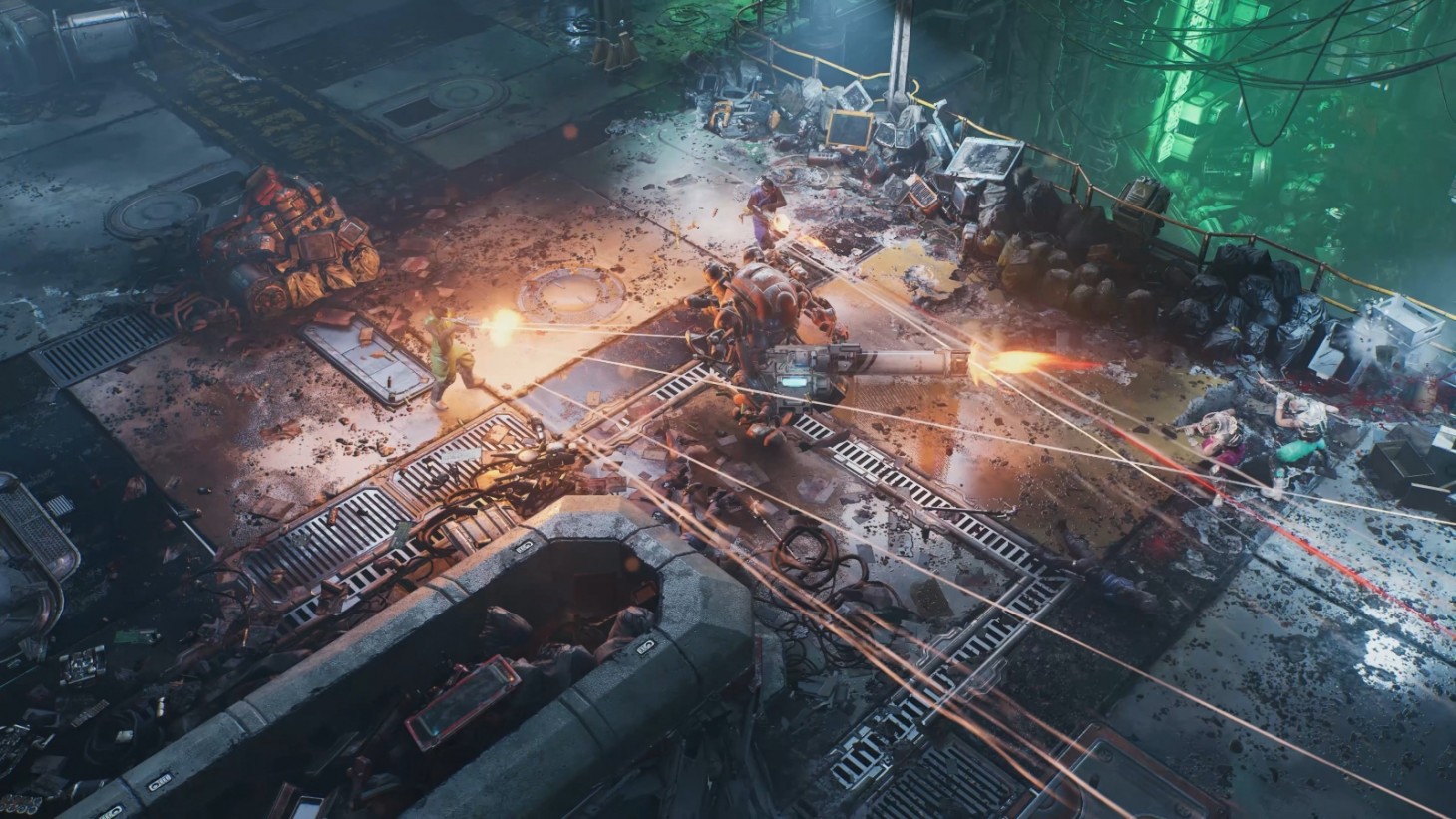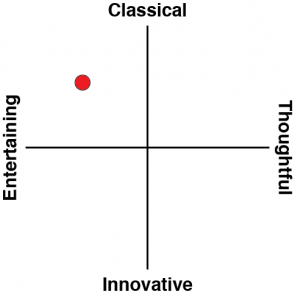The Ascent looks gorgeous in the kind of grim and nihilistic way that the best in the cyberpunk genre can look gorgeous. That gets it off to a most excellent start. From wading through the gank of refuse waste and… much less wholesome byproducts from humanity’s essentially wasteful existence, right through to marching over the rusted metal streets that comprise the cities, and hanging out in pubs that look and sound like neon (yes, sound like neon. It’s the only way to describe it), it all looks the part. Everything about The Ascent promised cyberpunk fans that they would be able to forget about Cyberpunk 2077. That game struggled to ever look like anything but “corporations make cyberpunk with a giggle at how silly the genre is to them.” The Ascent seemed genuine, and that was exciting.
Unfortunately, any faith placed in the game is misplaced. The Ascent does nothing with its strong premise. Instead, it’s quite content being a generic (though well-made) dual-stick shooter with light-touch RPG elements. Is there a plot buried somewhere within the game? Sure. There’s a story. You’re an indent – short for indentured servant – and that means you’re basically a slave working for the corporation that tricked you to move to a hellscape city. Unfortunately, your corporation goes bust and suddenly your tenure, life, and everything else comes under very real threat. So, what do you do? Pick up guns and shoot things.
The basics of cyberpunk are there. Corporations are bad, bodies can be modified, resistance and revolution rises from the roots (i.e. “ascends”), and then there’s the question of what all of this says about humanity and our socio-economic and political systems? The problem is that across its 20-hour campaign, The Ascent never figures out how to go beyond those basics, or even grapple with them properly. It would be like reading Dracula and deciding that vampires are just monsters that suck people’s blood, or reading Ayn Rand and thinking that Bioshock was an adequate critique of the nuances of objectivism and… yeah, okay, the video game industry doesn’t do this stuff well as a rule of thumb, but it’s still particularly disappointing here, because it’s cyberpunk. We’re still waiting for the thought that went into great works of the likes of William Gibson and Neal Stephenson to truly be done justice in video games, and The Ascent is another misfire. It’s fine to make a dumb action game based on pulp fantasy fiction. Or turn Tom Clancy’s books into nationalistic shooters that excuse western militarism. That’s all those books are in the first place, so the video game adaptations do them justice. If you’re going to make a cyberpunk work, though, the audience is going to expect cyberpunk, and I don’t think that’s too much to ask. In fact, when we’re talking about particularly potent narrative genres, like cyberpunk, a narrative that can’t grapple with its core themes is a particularly significant problem.
So what do you get from The Ascent, if the narrative is as shallow as a toddler’s swimming pool that worried parents have drained, so that there’s no risk of little Johnny slipping and breaking a bone? You get a decent twin-stick shooter. Not of the same quality as Housemarque’s Alienation or Dead Nation, but still decent. It’s a grindy, looty, shooty kind of game where hordes of enemies are conveniently dropped into areas for pitched battles with plenty of cover and opportunities to blow things up, and the steady flow of new loot will almost make up for the fact that the experience and skills system is too shallow for an RPG. The difficulty level is robust (the game seems to be designed to be best enjoyed with a buddy), but the punishment for getting blown to pieces is never excessive. You’re just tossed back to a nearby checkpoint to give it another go.
It spruces up nicely on the PlayStation 5, too. This is one of the games that you’ll want to have a nice, large TV for. In part because the text becomes unreadable on a smaller screen, but also because the fireworks, character models, and levels themselves are all rendered to some incredible level of detail. You’ll get to feel the action, too, thanks to some good use of the DualSense’s haptic feedback. The Ascent is at its best when you’re frantically moving around a space, dodging both ranged and melee attacks from a misfit horde of thugs and rogues, and swapping between weapons because you just haven’t got the time to mess around with reloading. Thankfully, those moments where The Ascent is at its best happen with both normal groups of enemies and boss battles, and the thrill is consistently there, right to the end. Mindless as it was, I didn’t mind switching my brain off to indulge in some mindless, visceral action, and there’s certainly a place for that.
But then the game keeps bringing you back to its less engaging elements. Every time you come across a side-quest, you’ll groan because on the one hand, you’ll feel the need to complete them, but on the other, they’re menial tasks of the very lowest calibre. We’re talking about often having to delve into already-completed dungeons to kill certain enemies and collect certain things. There’s also a dearth of things to do outside of combat too, meaning that the relatively interesting non-combat zones are, effectively, empty spaces to travel between. In the end, what initially seems to be a city full of intrigue and storytelling opportunity (from that opening cut scene), becomes one of the most disappointing spaces I’ve ever seen in a video game. This isn’t Blade Runner’s exotic and evocative cities that we’re exploring. It’s not even Total Recall’s. This game’s arbitrary hubs spaces may as well be menus for all the joy they bring to the experience.
I must reiterate that The Ascent is gorgeous, and for a team of just a dozen developers, they have outperformed themselves in that regard. Unfortunately, because the narrative is so anaemic and there is so little that connects the narrative to the aesthetics and gameplay, The Ascent ends up feeling empty. There’s nothing memorable about the characters, the world is dull and far too large for how little it offers, and while, yes, the story hits those key cyberpunk talking points, the developers largely missed the nuances that elevate cyberpunk beyond pulp fiction. So, again, the game’s fine, if you are looking for a generic sci-fi shooter (and can ideally drag a friend along). As a work of cyberpunk, though, it’s a failure.












